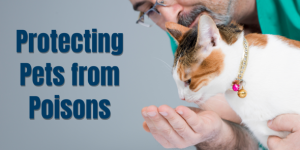
March is Poison Prevention Month and it’s a good reminder on how to protect your pet (or foster pet) from ingesting anything toxic. Let’s go over a few common and serious toxins. First, please share with friends and family that LILIES ARE EXTREMELY TOXIC TO CATS! Often the flowers are in bouquets and floral arrangements, and the plants are especially popular at Eastertime or commonly grown in landscaping. Everything about lilies is toxic – from the petals to the leaves to the pollen and even the water from its vase! Cats often die within days to a week after ingestion, including licking pollen off of their fur. I’d like to share my experience with you when a foster who, knowing lilies are toxic to cats, received a floral arrangement and kept the flowers high on a shelf away from the cat. After several days, the plant began to drop some leaves and they observed the cat chewing on a fallen leaf. Within days the cat was critically ill and in acute renal failure. All lilies should come with a warning on how extremely toxic they are to cats!
Second, with the legalization of marijuana and the increase in medical uses for THC there have been more accidental intoxications in both cats and dogs. Exposure can be in the form of ingesting edibles to breathing second-hand smoke. Fatalities were very rare until the development of medical grade THC. If you notice abnormal behavior in your pet after exposure, it’s best to call your veterinarian or a veterinary emergency hospital.
Lastly, a somewhat newer toxin is xylitol, a sugar substitute commonly found in sugar-free foods (gum, candy, ice cream, baked goods, toothpaste, some peanut butters, etc). If the label reads “sugar-free” it’s best to not give it to your dog. For example, always check the label on peanut butter before using it as a treat. If you think your dog (and even cat or ferret) ingested anything containing xylitol, call a veterinarian immediately. Xylitol is absorbed quickly and can cause a life-threatening low blood sugar.
If you’d like to learn more about how to prevent your pet from a toxicity, check out the ASPCA website. Also consider posting the following phone numbers for all of your pet’s caretakers to see – your veterinarian, nearest 24 hour veterinary emergency hospital, and ASPCA’s 24 hour Emergency Animal Poison Control Center at (888) 426-4435.
Hoping you and your pet always stay safe,
Dr. Barbara Hanek,
Veterinarian Administrator
